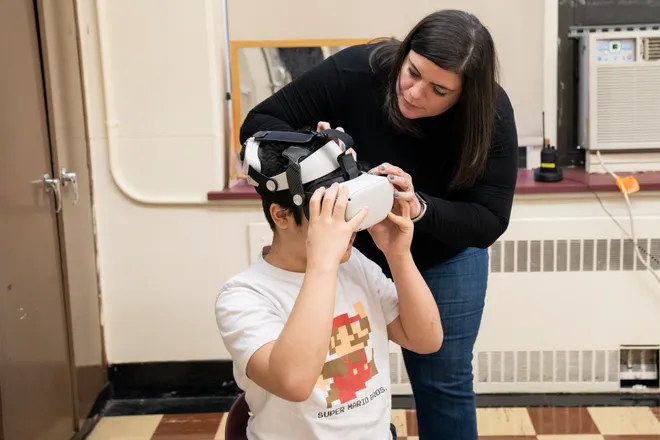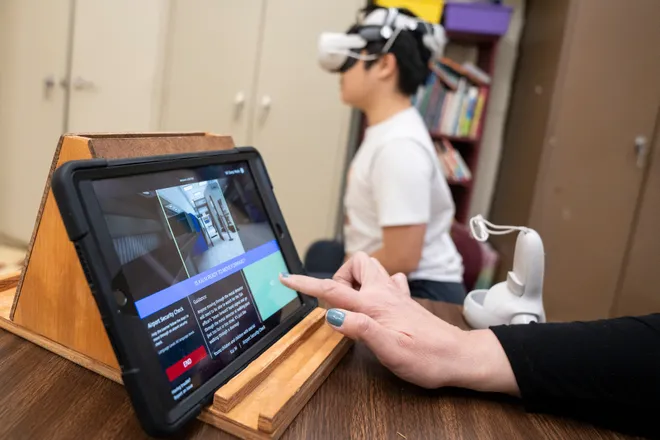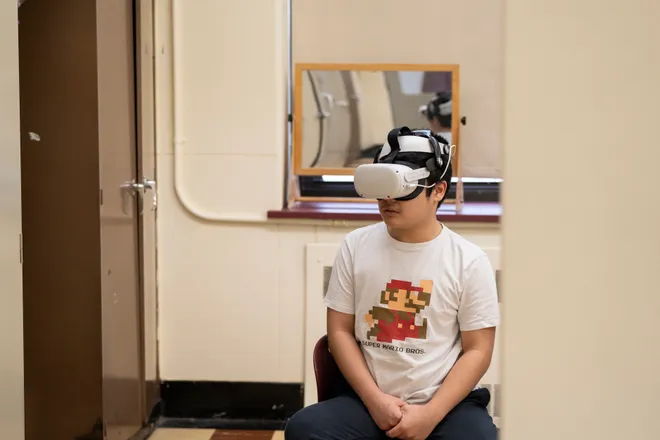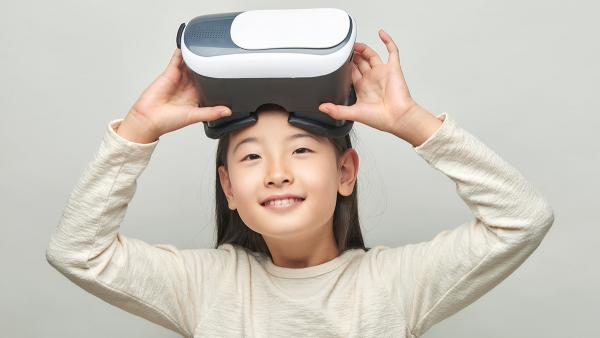If you think a TSA checkpoint is stressful, imagine how anxiety-producing it can be for a child with autism.
With spring break season upon us, it’s a problem facing many families in New Jersey, the state with the highest rate of autism in the country.
The Nutley-based Phoenix Center, a school for kids with disabilities, is using virtual reality to try to ease the journey. The school, which has 135 students on the autism spectrum, has been using a Meta Quest 2 headset as part of a pilot program this year to expose students to the chaos of the airport in a controlled, virtual setting.
“”We’re able to bring that world to them first before they actually experience it outside, and that’s an opportunity that we haven’t had yet,” said Phoenix Center speech therapist Mali DeSantis. The VR program, she said, gives the staff “a safe space to bring the outside world to them.”

About 15 students have participated so far, and school officials said they plan to expand the training.
It has worked for 16-year-old Kaito, a student who found virtual reality so helpful that he can now travel stress-free with his family, he said. The school withheld his last name, citing state Education Department privacy requirements.
Through the VR headset, he’s seen “deserts, wildlife, trains, rivers,” Katio said. In the real world, he added, he’s now been with his family to Tampa, Toronto and Miami Beach.
Students pull on the headset, find themselves in a simulated airport and then follow a red dot that guides them through its checkpoints.

“You start off as checking in, you show your boarding pass and then there is a red dot,” said speech therapist Christine Hartz, who helps run the sessions for Phoenix students.
“You walk through the line until you come to the TSA agent, and then you have to remove your shoes,” Hartz said, referring to a representation of the Transportation Security Administration. “You have to place your items on the conveyor belt and then you have to walk through the X-ray machines; you have to stand, put your hands up, it scans you, and then you walk through and obtain your items.”
It’s an example of a training method the group Autism Speaks calls applied behavior analysis, which breaks down daunting activities into smaller, repeatable steps. It’s how therapists can help people on the spectrum tackle large, intimidating goals, therapists say.
That’s how navigating airport security became manageable, even enjoyable, for Kaito, who has used the headset “many times.”
He’s been able to fly without feeling nervous, he said. VR helped him “know what to expect” and “act like an adult” in airports.
The pilot program was DeSantis’ idea. She had read about the potential for VR in an email from Floreo, a Washington, D.C.-based company that has produced an FDA-designated device for “neurodiverse learners.” The technology is in use in schools across the country, the company’s website says.
Floreo says its software turns a smartphone or VR headset into a “virtual learning environment” where people “can practice communication and social skills at their own pace.”
The company sells three versions of its software, tailored to consumers, school settings and state-funded agencies. Prices vary for institutions, but for $69.99 a month, individuals and families can purchase a subscription with access to a library of VR lessons.
Julie Mower, Phoenix Center’s executive director, likes what she has seen so far.
“The positive outcomes from the Floreo VR pilot program convinced me to allocate funding for its continued use next year. This allows our therapists to expand VR therapy across more age groups and students,” Mower said. “Building upon the pilot’s success, I anticipate even greater results in the upcoming year.”
Tips for traveling with autism
Autism Speaks offers the following tips to parents.
- Inform the TSA agent: Tell them about your child’s needs and medical devices. Let them know your child may become upset during screening. Offer tips on the best way to handle the screening.
- Private screening: If required, you can stay with your child during the process.
- Explain abilities: Tell the officer about your child’s abilities, such as whether they can stand on their own and walk through a metal detector.
- Pat-down search: The agent will conduct a pat-down search for children in mobility aids. They can stay seated. You can also request a chair for a child with impaired mobility if needed.
Gene Myers covers disability and mental health for NorthJersey.com and the USA TODAY Network. For unlimited access to the most important news from your local community, please subscribe or activate your digital account today.
Email: myers@northjersey.com
Twitter: @myersgene


